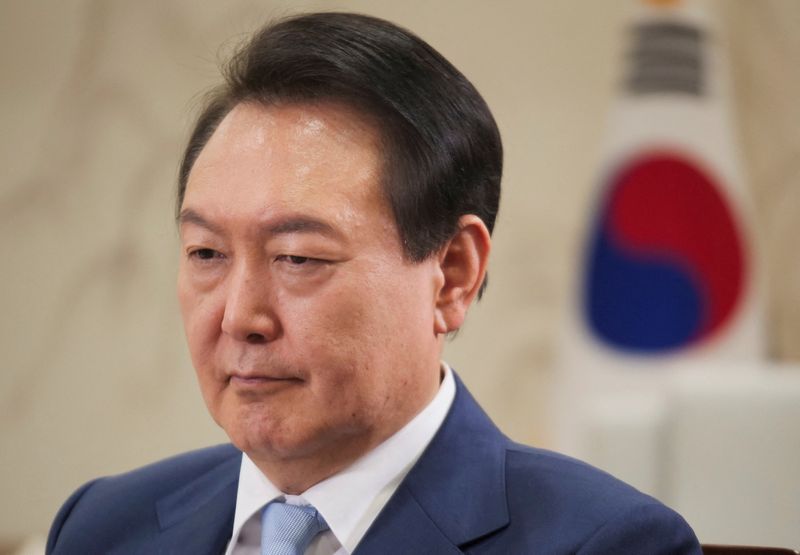By Josh Smith
SEOUL (Reuters) -South Korean President Yoon Suk Yeol and his wife will visit Japan from March 16-17 at Tokyo's invitation, his office said on Thursday, the first such visit in 12 years after Seoul announced a plan to end a protracted dispute over wartime forced labour.
South Korea said on Monday that its companies would compensate victims of forced labour under Japan's colonial rule from 1910-1945, seeking to end a dispute that has undercut U.S.-led efforts to present a unified front against China and North Korea.
Yoon will hold a summit meeting with Japanese Prime Minister Fumio Kishida, Yoon's office said in a statement, calling it "an important milestone in the improvement and development of relations between South Korea and Japan."
South Korea is an important neighbour with which Japan should cooperate in addressing various issues in the international community, Japan Chief Cabinet Secretary Hirokazu Matsuno said at a briefing.
“I hope that through this visit to Japan, Japan-Korea relations will further develop based on the friendly and cooperative relations that have existed since the normalization of diplomatic relations.”
He said "nothing has been decided" when asked about potential agenda items.
The Japanese government is also considering inviting Yoon to the Group of Seven (G7) summit meeting in Hiroshima this May, Kyodo news agency reported on Thursday night.
Yoon's office said he hoped to expand various security, economy, and cultural fields, and revitalise exchanges between people in the two countries "in order to overcome the unfortunate history of the past and move forward into the future."
South Korea's defence ministry said on Tuesday it would work with Japan to enhance security cooperation, including trilateral relations with the United States.
The two countries also agreed this week to negotiate to end export curbs on key electronics components.
Yoon will likely return from Tokyo with progress on harmonizing export controls and renewed Japanese backing of Seoul’s approach on North Korea, said Leif-Eric Easley, a professor of international studies at Ewha University in Seoul.
Yoon said earlier this month that cooperation with the United States and Japan has become more important than ever to overcoming North Korea's growing nuclear threats and other crises.
Kishida will be able to claim South Korean support for Japan’s evolving defense posture and trilateral coordination with the United States to maintain a rules-based order in Asia, he added.
"Not all history issues will be resolved, because between democracies reconciliation is a process, not an agreement," Easley said. "But the two leaders are determined to move cooperation forward on trade and security."
Relations plunged to their lowest point in decades after South Korea's Supreme Court in 2018 ordered Japanese firms to pay reparations to former forced labourers. Fifteen South Koreans have won such cases, but none has been compensated.
Japan has said the matter was settled under a 1965 treaty and Japanese Foreign Minister Yoshimasa Hayashi said on Monday his government's stance had not changed.
Washington had pressed its allies in both countries to reconcile and called the latest announcements "groundbreaking," but several of the victims have vowed to reject the compensation, setting the stage for more political and legal battles.

U.S. President Joe Biden will host Yoon for a state visit on April 26, the White House and Yoon's office said on Tuesday.
It would be the second state visit of Biden's administration, and the first state visit to the United States by a South Korean president since 2011.